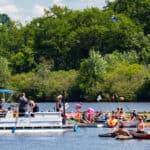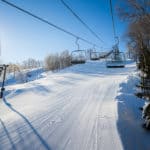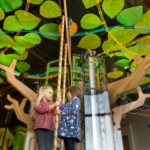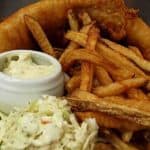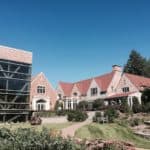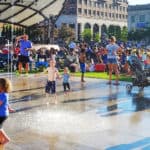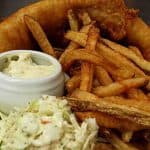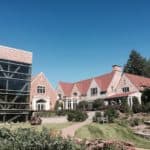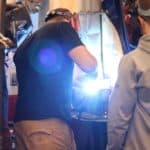Wausau Mall Stores: The Buckle, Maurices and Spencer’s now call the Rib Mountain Drive retail corridor their home. Reflexology Massage is now located on 3rd street and Fashion Mix is located at their new location on Thomas Street.
Washington Avenue and Third Street will be open during demolition. However, occasionally streets may be temporarily closed for movement of large equipment or work done to the front of the Wausau Mall. This will be done for safety reasons. Street closure signage will be posted to warn and redirect traffic.
Yes! Directions and all Downtown Wausau parking information can be found here.
Parking in the Wausau Mall ramps is free for the first 2 hours. After parking your vehicle, you’ll need to register your license plate using the lot’s Pay Station or Passport Parking phone app.
Parking ramps are easily accessible from the city streets and are clearly marked with signage. Enjoy 2 hours of free parking on any downtown street, parking lot or ramp. Click here to find the hours for ramps and lots by location or to see a downtown parking map.
Street Parking: Enjoy 2 hours of free parking on any downtown street. No registration required. No re-parking in the same block for the day.
Lot Parking: Park and register your license plate using the lot’s Pay Station or Passport Parking phone app. The first 2 hours are free per day.
Ramp Parking: Park and register your license plate using the ramp’s Pay Station or Passport Parking phone app. The first 2 hours are free per day.
Yes, parking ramps are easily accessible from the city streets and are clearly marked with signage.
Yes, Concerts on the Square events are Wednesday evenings from 6-8 pm, June 14 – August 30, and Dining on the Street on Wednesday nights from 5 – 9 pm with participating restaurants.
The JC Penney building will remain standing for now because it sits atop an important and valued parking structure. The building serves as a protective barrier against the elements, too. Once future development for the current JC Penney site is identified, the building will be removed to make way for a new development.
The mall area being redeveloped is 6. 5 acres. This does not include JC Penny which will be a 2.65 acre development. Of the 6.5 acres currently under development, approximately 2.6 acres was returned to the City of Wausau for street development (2nd Street, 3rd Street, and Jackson Street)
The City/County Parks Department secured the statue, keeping it safe until they determine a new place to relocate the Boy with the Boot.
The redevelopment will unfold in phases over several years. Sewer and temporary street construction are projected to be completed in August 2023, HOM Furniture façade is projected to be completed in summer 2023, the Children’s Imaginarium is projected to open in fall 2023 and Foundry on 3rd is projected to break ground in spring 2024.
The plans for the site include mixed use of market-rate apartments, restaurants, retail and specialty boutique businesses. Opportunities for office space will be available, too. Accompanying the development of new streets and buildings will be public green space and public marketplace.
Wausau Opportunity Zone, Inc. (WOZ) owns the redevelopment site and is collaborating with experienced developers to create housing, retail and commercial opportunities for the community.
Click here to learn more about Wausau Opportunity Zone, Inc.
Downtown housing currently is in demand. This complex will be a magnetic place for young professionals and others who want to live downtown with nearby restaurants, shopping, special events, entertainment and other walkable amenities. It also offers retail space to shop owners wanting to be positioned in the heart of the city.
A five-story building with 154 urban apartments, ranging from micro-units to three-bedroom units. There will be underground parking, green space in the courtyard and co-working spaces for tenants. Approximately 17,500 square feet of retail and commercial spaces are included in the plans.
The Children’s Imaginarium will open on December 6, 2023! Check for updates on their Facebook page.
The mall redevelopment zone is entirely in TIF District 12, as of April 2023 when the boundaries were amended.
Tax Increment Districts (TIDs) are designated areas that allow new tax increments created in the district to be used within the district to incentivize development. When a TID is created, baseline property values are frozen and the new increment subsequently generated is returned to specific projects and used for public infrastructure improvements in the area. Whether a project receives Tax Increment Financing (TIF) assistance is determined by a “but for” test. The “but for” test assesses whether the project could happen in the same location, in the same timeframe, or in the same scope “but for” TIF assistance.
TIF is not used to finance projects that could occur without assistance or projects that would not grow the tax base enough in the long term to justify its use. TIF is used to finance developments that would not otherwise occur, that increase the tax base. A large tax base helps everyone’s tax bills go down, so growth is key. TIF can encourage growth and is therefore a useful tool to grow the tax base while controlling increasing tax burdens.
TIF assistance is the primary tool to incentivize developments in Wisconsin. Wausau primarily uses reverse or pay-go TIF for qualifying developments, meaning that no up-front money is invested in the project. In these cases, the developer only receives TIF payments, generated by the project, after a project has started generating the new increment. Click here for more information.
Opportunity zones are economically distressed areas designated by the U.S. government to promote development and prosperity. These zones were established as part of the Tax Cuts and Jobs Act of 2017 to encourage long-term investments in low-income urban and rural areas. Investors can receive attractive tax incentives while also supporting the revitalization of struggling areas. The State of Wisconsin has designated tracts in downtown Wausau to offer great opportunities for the community.
No. While there are several isolated stands of second-growth northern mesic hardwood communities atop Rib Mountain State Park, much of the landscape, including the north face, is covered with trees with lower lifespans. Many of these species struggle to survive due to vulnerability to insects and diseases, with normal regeneration of many tree species limited by thin soils, steep slopes and over-browsing by deer. Opening spaces for ski runs and trails may increase forest sustainability by expanding edge habitat and allowing for deeper solar penetration into the forests.
Yes. All four alternatives have been reviewed for environmental impacts. While each alternative has a larger footprint than the former, the design layouts suggested by the SE Group are carefully inserted on the landscape to allow for minimal impact. Work will continue with the Wisconsin DNR on preserving Areas of Highest Ecological Concern.
The goal is attainable due to Wausau’s location and the existing base of premier recreational activities already in place in the area. If Option Four were approved, the area can become an IMBA Mountain Bike Ride Center, drawing thousands of enthusiasts from around the country. The expansion of Granite Peak will amplify its status as one of the premier alpine ski areas in the central U.S. The addition of summer activities utilizing the vertical landscape at Rib Mountain State Park will potentially separate the area from all other Midwest recreational destinations.
Over the last 90 years, non-winter use of the ski lands at Rib Mountain State Park has amounted to only occasional events and some hiking. However, with its high vertical terrain, the landscape at the ski area can provide for exceptional experiences not found elsewhere in the state. These could include flow and gravity mountain bike trails, ski lift and forest tours, zip lines, a mountain coaster and additional events centered on outstanding scenery and open space. The SE Group recreational assessment points out a variety of experiences that could be created to greatly expand non-winter visitation to the area.
If Option Four is chosen as the preferred course, the majority of proposed improvements will be completed in four to six years, with the remainder being built out within a 10-year timeframe.
Granite Peak Ski Area would pay for leased land for new ski terrain, base facilities, lifts and proposed summer activities like zip lines, mountain coaster and challenge courses. Sponsors and donations would generally pay for mountain bike trails. The Wisconsin DNR is not expected to have any costs associated with recreational expansion.
No. The existing “top of the mountain features,” such as the amphitheater, day use areas, tower, Friends shelter and parking lots will be untouched. Hiking trails off the top will also continue to exist and be open to use. The quarry area will be untouched. The only alterations described in the SE assessment are the addition of multiple-use areas on small portions of existing trails and the grade adjustment to hiking trails in certain areas to improve their sustainability or alignment with other recreational features. Hunting will also continue at the park, as will skiing at Granite Peak, which is working with the DNR to facilitate safety and seasonality.
Yes. As noted in Mountain Recreation Needs Assessment — part of the SE Group’s Climate Change Assessment — there will be an expected reduction in the viable length of ski seasons in the Midwest. Granite Peak’s operating season may shrink from five months to three. Since the Greater Wausau area wishes to grow current annual visitation levels, a growth in ski terrain capacity and facilities will be needed to serve more visitors in a shorter timeframe.
Granite Peak has a need to expand and modernize ski and year-round resort infrastructure to maintain viability in the mid-west ski market in terms of both guest expectations and adaptations to climate change. Nationwide there has been a decades long closure of ski areas while ski populations continue to be stable. A complete ski area now has adequate ski terrain and lifts for all levels of skiers, adequate base facilities to meet customer demands, sufficient parking, and a modern ski school. Currently, Granite Peak Ski Area does not have the terrain available to provide facilities and services at the level that customers desire.
No. Mountain biking enthusiasts have been requesting mountain bike trails at Rib Mountain State Park since 2006. Granite Peak Ski Area has been discussing potential expansion for alpine skiing with the DNR since 2014.


